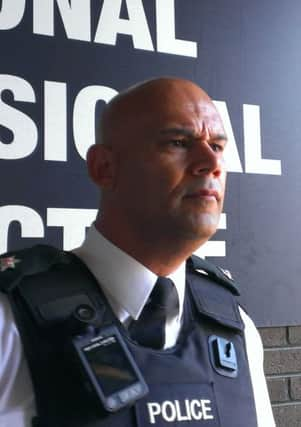PSNI now able to film acrossNorth West with body cams


Superintendent Garry Eaton, G District Operations Manager, told the Sentinel that during a six month pilot period the new cameras will be used by response units.
He also effectively discounted their suitability for addressing riot situations and for counter-terrorist operations.
Advertisement
Hide AdAdvertisement
Hide AdSeventy police officers across Londonderry, Limavady, Strabane and Magherafelt will be using the ‘body worn cameras’ at any one time once the roll-out is fully operational on Wednesday (June 18) and Superintendent Eaton says they are likely to be of most use in responding to domestic violence call outs.


Key stakeholders - including the judiciary, the Public Prosecution Service (PPS), defence solicitors and the Policing and Community Safety Partnership (PCSP) - are all expected to provide feedback during the trial.
Superintendent Eaton says filming and retention of the film is entirely legal. He said: “I think the legality of this, to put it very simply is this: We are duty bound and charged to gather evidence of a crime and prevent and detect crimes and so, a legitimate method to gather evidence in the 21st century is to record it.”
He does, however, expect a robust examination of the ‘business rules’ governing the use of the cameras over the coming months.
Advertisement
Hide AdAdvertisement
Hide Ad“There are business rules. We’ve obviously circulated those business rules to stakeholders,” he said.
“We will expect a robust examination of those business rules and feedback during the evaluation process but the rule of thumb is thirty days. If it’s not of any evidential value it will be deleted.”
He added: “It would be a very rare scenario where we would be holding on to data that we don’t consider to be of evidential use for any period of time. It would be very plain, I would hope, that when you take the footage that there’s a good reason for it.”
He said subjects of the cameras will be clearly advised that they are about to be recorded.
Advertisement
Hide AdAdvertisement
Hide Ad“Nobody will be surprised when an officer turns up,” he said. “They will be told by officers: ‘I am recording you. This is a body worn video camera.’
“They will not be left under any illusions. And I accept that people will react differently. If it’s a situation where a police officer comes into your home with a camera. You might have something to say about that.
“But that’s the type of situation officers are going to have to deal with.”
He also explained that the cameras are unlikely to be used in riot situations.
Advertisement
Hide AdAdvertisement
Hide Ad“I don’t think it’s practical to use it in a riot situation. In a riot situation, I think the officers will be focused on preventing harm, focused on the job they have to do, but I think there are some situations where one or two of the officers might have cameras but we already do that,” he said.
The senior police officer also says he doesn’t believe the cameras are suitable or necessary for counter-terrorist or intelligence gathering purposes.
“Firstly, the camera battery life doesn’t allow it to be permanently switched on. It would negate its benefit in my view.
“It’s got a two and a half hour battery life. We would say that’s enough to cover eight hours of specific incidents but if you left it on I wouldn’t see the benefit of it. It’s not designed to be used that way,” he said.
Advertisement
Hide AdAdvertisement
Hide AdBack in 2011 representatives from Foyle Women’s Aid raised the matter of ‘body worn cameras’ at a meeting of the Londonderry District Policing Partnership (DPP).
Superintendent Eaton said domestic violence incidents would be one area where he believed the new devices would be particularly useful.
“I think Foyle Women’s Aid’s position is well-documented. They’ve consistently campaigned and had conversations over the last number of years.
“They feel the cameras will be of benefit in domestic violence situations and I don’t think anyone’s disagreed with that,” he said.